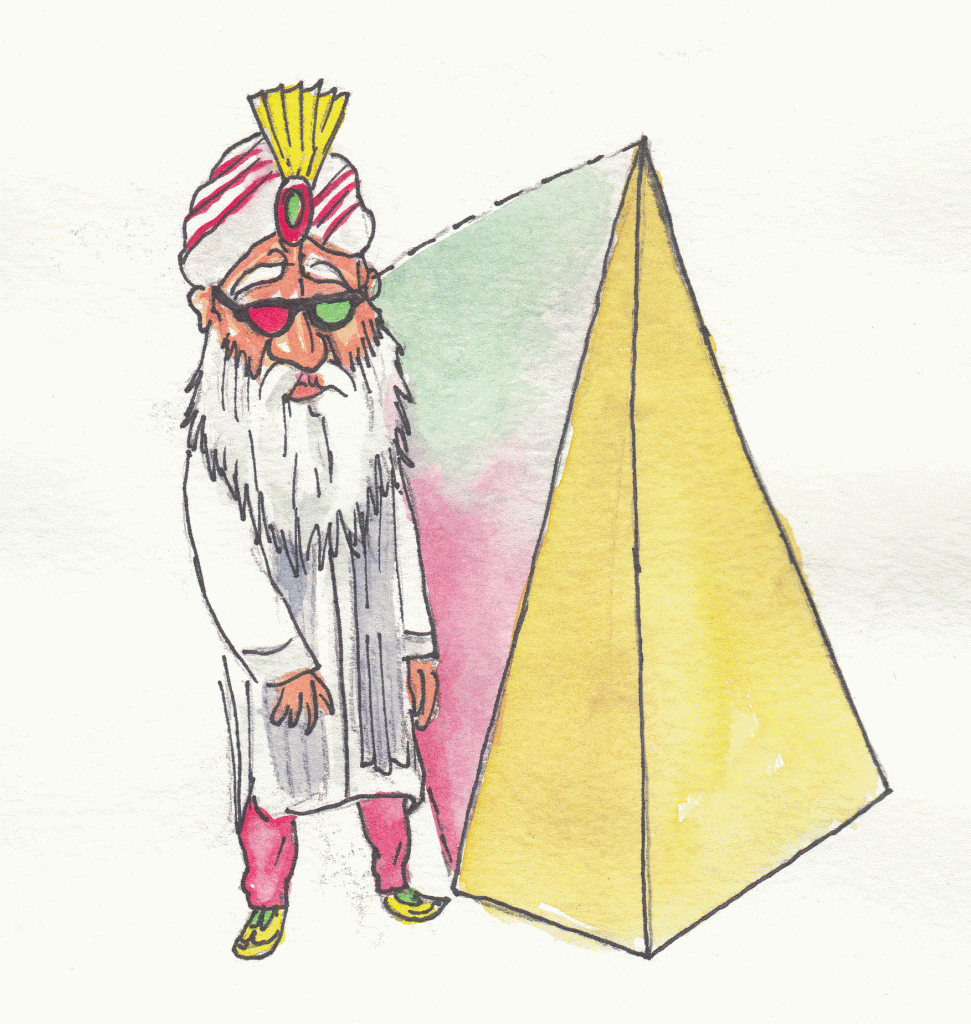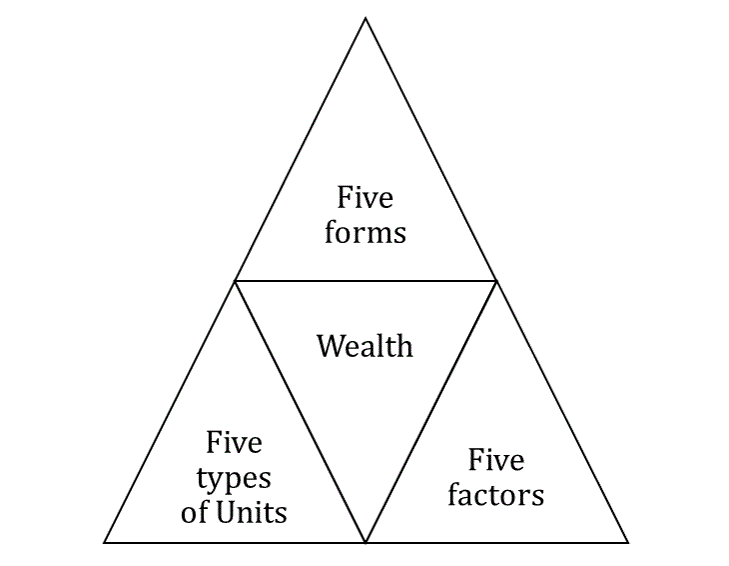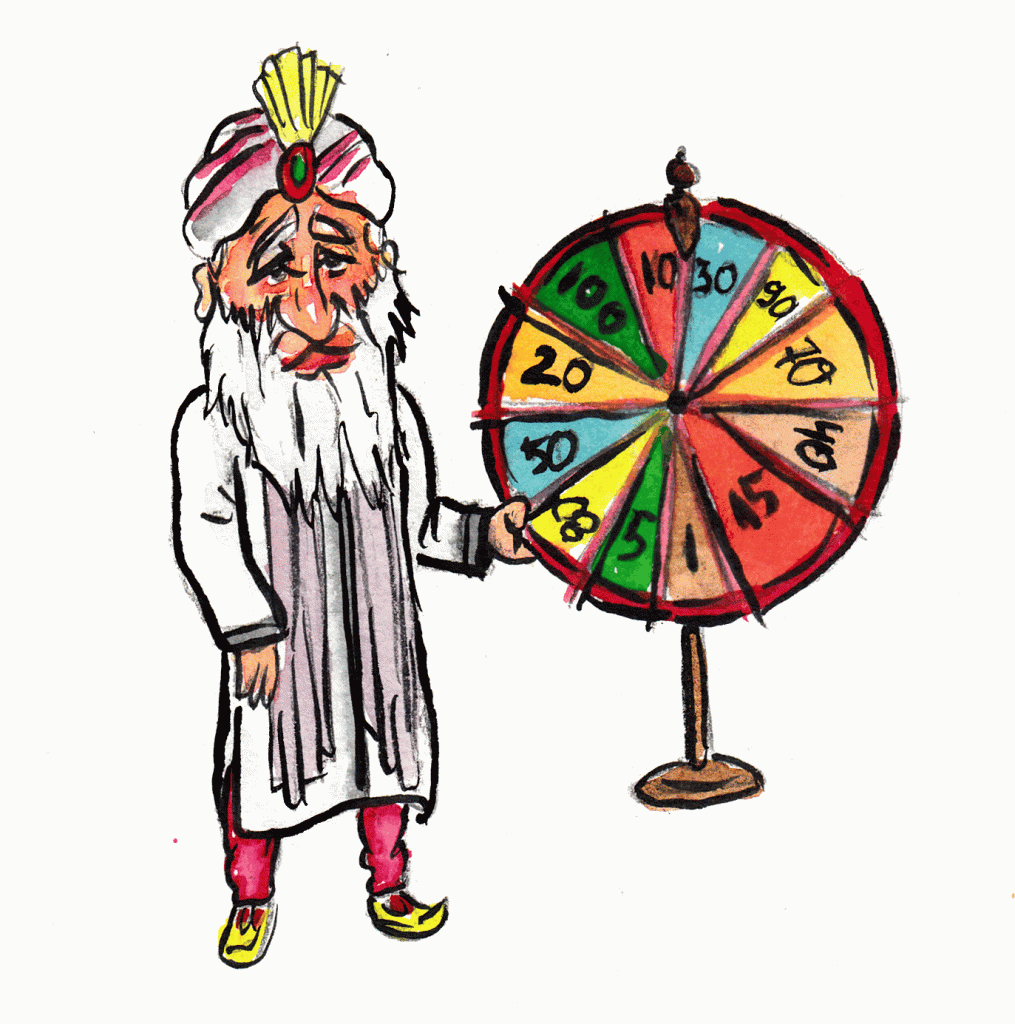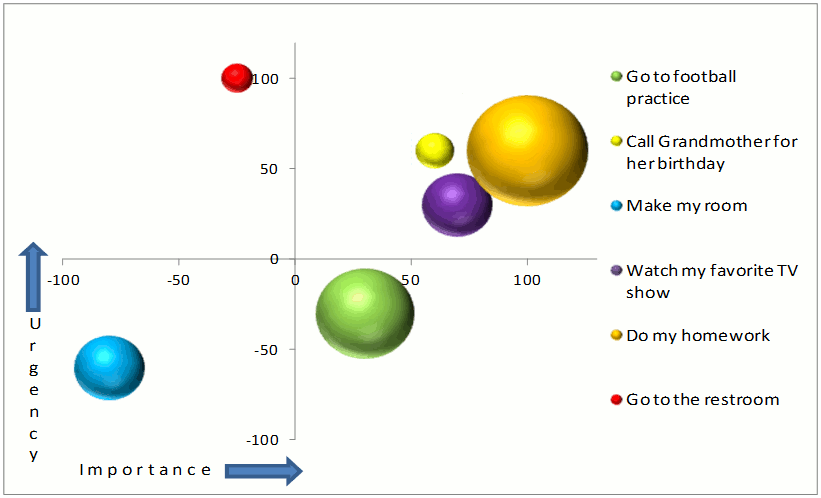Sri Humana: Enough of this accounting bullshit. Wealth is much more than just property, classified into accounts. Thomas pisses me off with his narrow views about wealth, so I have developed a new, comprehensive approach to thinking about wealth. I call it “Building Your Wealth in 3D.” It’s a revolutionary approach to success, which involves multi-task thinking. I created this idea to help people focus on the important things in life, right from the start.
One concern in developing the approach was making it easy to use, with little effort but with enormous positive impact on one’s life.

Thomas: Big words …
Sri Humana: So, there I was, pounding may head over these important questions, when suddenly it hit me: We should look to the natural world around us to see how Nature solves problems. Nature presents the observable universe to us in three dimensions – so there must be a way we can analyze our wealth in three dimensions, too.
Here are the three dimensions I discovered.
- Wealth units – these are entities that strive to become wealthier. They could be individuals, families, groups of people, corporations, etc.
- Wealth forms – these are all the possible ways in which this abstract word “wealth” can emerge – all the forms wealth can take.
- Wealth factors – these are all the wealth-drivers – things or factors that can act as catalysts to your success on the journey to wealth.

First, let us define wealth as tangible or intangible things that elevate a person, family, or group to a better condition. As you build your wealth in three dimensions, I want you to keep in mind the five forms of wealth – which I will describe – as well as the five wealth success factors and the five types of wealth units.
Thomas: But, why is everything in fives?
Sri Humana: Five is a magical number. It is really just a number I just came up with myself – but don’t tell anyone else that.
I have drawn each of the three wealth dimensions as circles. Each has its five factors arranged around it, in a clockwise sequence. Starting with the factor at the top, as you go farther clockwise, the factors become more philosophical, uncertain and difficult to manage or accomplish.
I recommend that you tackle each of the three dimensions by starting at the top-most factor, and working your way through the other factors in the clockwise direction. This does not mean you have to postpone paying attention to the farthest factors forever, though!
The more successful you are, the more you will find yourself focused on the left-side-circles (the ones farthest around). Yet, to succeed in the farther circles, you may need some resources acquired in the earlier circles.
—————————-
And that is Sri Humana’s modern pseudo-scientific wealth theory.
Now let’s look at the three dimensions he is talking about:
Dimension 1: Wealth forms

Material Wealth – We have talked about material wealth all along. To sum it up, our material wealth is our net worth. By this point, you have an understanding of what your material wealth is, and you’ve probably gathered some quantitative information about it.
Physical Wealth – By “physical wealth” here, we mean your personal physical (body) health.
Emotional Wealth – Emotional wealth is all about your inner self, your state of mind.
Group Wealth – Group wealth is the total wealth of a certain group – the group itself, as a group (not necessarily the sum of the wealth of each of its members).
Common Wealth – By “common wealth” we mean the total wealth in the world. It’s the sum of all kinds of wealth, monetary and otherwise. There are some general indexes that try (but fail) to measure the world’s wealth or various aspects of it – think GDP, inflation, S&P, income per capita, etc. The problem with these measures is that while trying to be as quantitative as possible, they fail to measure important things in life like happiness, friends, time, peace, health, etc. Instead, they focus only on the money side of the picture.
Here are some practical aspects of wealth forms to consider.
Your material wealth can be stated as a positive number, a zero, or a negative number, depending on your assets and debt. There are people who are poor, but there are also people who are deeply in debt – which means they are not only poor right now; they will stay poor for a long time.
Health, on the other hand, cannot be negative – it cannot go “below zero,” because reaching zero health would mean you were dead. You are born in a certain condition – a certain state of health. You can then improve your health with things like good nutrition and positive stressors such as exercises. You can also ruin your health with bad food, damaging or inappropriate stressors, or accidents.
Time is another dimension that cannot be measured in a negative (less than zero). Otherwise we would be able to travel back in time. You have time available to you. It is a resource. You can waste it, or spend it on something worth doing.
Friends and emotions are a form of wealth. Both can be positive, but they can also be negative – less than a zero value, decreasing your overall wealth. What is worse than having zero friends? Having zero friends and a million people who hate you.
Knowledge can also be negative – a person could be taught so much false information that he could not function in life. Or he could be educated into wrong-doing. Harming others is far worse than doing nothing. From ancient times to today, doctors have sought to follow the principle, “First, do no harm.”
To increase your non-material and material wealth in sustainable ways, you should begin by limiting your downsides. Repay debts, don’t harm others, get care for health problems (and don’t die!). Only after you have looked for such things and begun fixing them should you look at your opportunities to directly increase your wealth, in all its dimensions and forms.
Dimension 2: Success factors

These wealth drivers have great importance, so let’s discuss each of them separately.
Dimension 2, Wealth Success Factor Nr.1 – Discipline

Sri Humana: Here I shall try to explain the importance of self-discipline, which is Success Factor Nr.1 in my classification system.
By being disciplined, I mean being systematic, following whatever rules you have chosen or defined for yourself, and of course never giving up. Being self-disciplined is following your goals and doing it your way.
Discipline – a systematic approach to following predefined rules or orders.
Self-discipline can be defined as the ability to motivate oneself in spite of a negative emotional state. Qualities associated with self-discipline include willpower, hard work, and persistence.
But, why do most of us fail at self-discipline?
The thing is, we are all human; we experience dilemmas in connection with our inner goals. Such every-day dilemmas quite often take the form of choices between satisfying our immediate or current needs, or giving more attention and effort to satisfying our future, long-term goals. Like any other sort of animal, we are naturally focused on our immediate needs. This is the natural result of evolutionary processes, influenced by the fact that there are basic, immediate (or current) needs that are vital to survival. Humans used to live relatively short lives, in small tribes. Thinking about the far future was not a favorable strategy.
Nowadays, basic needs are still as important as they ever were – but now we often judge a person’s level of success based on how forward-looking his or her actions are. This is because we can now satisfy our basic needs with less effort, freeing us to give increased importance to longer-term concerns like self-actualization (see Maslow’s hierarchy of needs).
Another common problem discipline presents relates to our desire for instant feedback or gratification. New technologies speed our communications, travel times, information flows, and ultimately our lives. The more we speed up our lives, the more we tend to desire immediate gratification and feedback. Video games, for example, nurture these feelings in ourselves and our children. In playing a video game, you understand very quickly whether you will make it to the next level or not. In real life, however, validating or disproving an important hypothesis you’ve developed may require years or even decades of waiting.
Give your hypotheses proper time-frames for validation or disproof.
I have encountered many real-life examples of people who have succeeded at something only because they were systematic and never gave up.
Yes, if you want to succeed at something, you definitely need discipline.
Dimension 2, Wealth Success Factor Nr.2 – Knowledge

I do not think most of you need any kind of explanation or proof that knowledge is a must for success in any endeavor. We all see the differences in pay between manual and intellectual work – though of course supply scarcity is a factor in any market.
Let’s look at some important knowledge drivers and characteristics.
Curiosity – Curiosity is the drive to know new things. Humans are considered particularly curious, but in our case, we have gone beyond the sort of curiosity we see in animals and developed an additional type of curiosity: curiosity about curiosity itself. This has led us to develop imagination, self-awareness and consciousness.
Laziness – If you are a little bit lazy, it may not be a bad thing – it could drive you to think about easier or faster ways of doing things – efficiency. I consider laziness – not the state of being lazy but the striving to be lazy – as a human-progress accelerator.
Mastery – Most people want to become very good at whatever they do. In some, it’s a burning desire. It can be as powerfully motivating as a big bag of money, believe me!
—————————
The most important thing to know here is this: the only way to explore any of the other success factors is to begin by gaining some knowledge about them. (I say “some” because knowledge is probably infinite.)
Knowledge can come from two sources. First is the widely advertised and obvious one: “the books.” Your second option is to search for knowledge through trial and error. This is riskier, but it is the basis of the sometimes-highly-rewarded path of innovation through experimentation.
Freely sharing your ideas (and knowledge) can benefit you – others may expand on what you share, or point out errors or misconceptions you hadn’t realized were there.
Dimension 2, Wealth Success Factor Nr.3 – Networking

Now we will look at networking and some of its side effects.
Sri Humana gets scientific about networking
Networking – an ugly word, but it can answer the question, “How much influence do you have in the society?” Your networking started on the day and at the place, you were born. Those conditions (that date and place) can have an enormous impact – positive or negative – on your success in life. (Just imagine if you had been born in Russia during World War II…) We cannot choose when and where we are born, but that does not mean our life paths are completely predetermined.
Networking is all about building relationships with mutual benefits. It begins in the family – which is a natural mechanism for promoting the survival of one’s genes. Nature invented this mechanism; elders provide youngsters (those who carry their genes) with material things, protection, and support. “Altruism” is the scientific term for caring more about others than about yourself. It is the opposite of selfishness.
But how can caring more about others increase your own chances of success? How have these altruist’s genes survived through centuries of competition with selfish people who seek only their own advantages?
When individuals compete, the more selfish among them often win. This prompts weaker individuals to organize themselves into groups, and group competition emerges.
So, we have two kinds of competition: individual competition and group competition.
An interesting phenomenon is that groups with higher percentages of altruists have better chances of prevailing over groups filled with selfish individuals. (Think of kamikazes, for example.) Altruism together with risk-taking and propaganda may partially explain the success of the U.S.
We understand that groups are important. People within a group typically share common ideas and common goals, and networking can help groups to form and interact. Today’s technologies have drastically changed our perceptions about networking. Thanks to technology, the number of connections many people have has increased dramatically – but at the same time, many of their individual connections are weaker (more superficial) than ever before. Everyone seeks to be a content generator (and sharer), but with so much content demanding our attention (including mass-media noise), we tend to filter it more and more stringently.
Here is how networking works: You send things out to others (messages, information, opportunities, etc.); eventually, if some of those others value what you have sent, they may reward you – either with recognition or with more tangible things.
Networking’s ugliest form is what’s called “business networking.” Special networking events are organized so boring businessmen and women (more precisely, wannabees) in suits can gather and look for opportunities to communicate their selfish interests.
Garret: Watch out, or my fancy-dressed friends and I will kick your ass.
Sri Humana: Bring it on!!!
Dimension 2, Wealth Success Factor Nr.4 – Karma Risk and Uncertainty

Sri Humana: There is a success factor hidden in the fabric of the universe; we call it destiny, fortune or Karma. Do not get me wrong – I am not saying we do not have free will. All I am saying is that the universe has its hidden ways, and all our actions have their specific consequences for us. We harvest exactly what we sow; no less, no more.
Thomas: Oh, stop. First, I do not want to get into any religious debates. [Lying! ] I have one question for you, though: How does your Karma explain lotteries and gambling games?
Sri Humana: Well, every action we take is like planting a seed in the universe’s garden. If you take care of the seed, a plant may grow, or it may not. You can win the lottery only if you play. Karma is the universal principle of cause and effect, action and reaction, which governs all life.
Thomas: I have to tell you, my views are quite different. And I want to rename your “Success Factor – Karma” to “Success Factor – Risk and Uncertainty”
——————–
If you believe in destiny, do not read the rest of this chapter. If you believe that if we knew the starting conditions and the hidden laws of the universe, we could predict anything we wanted to predict, again – stop reading right here.
If you do not believe that luck plays a significant role in your life, consider the following (old) facts:
- More than 1.2 billion people are living on less than $1.25 a day
- The average life expectancy in developing countries in 46 years
- Hundreds of millions of people do not have access to education
- More than 4.5 billion people do not use the internet
Now let’s discuss what risk is.
Risk is a scientific concept; it has to do with the probability that a particular event will occur, and measuring, estimating or calculating that probability. There is a metric used in calculating risk called standard deviation. I have to tell you that some risks cannot be measured quantitatively, due to lack of data or limitations in our theories or our measuring tools. (In quantum mechanics, for example – you can know either the speed of a particle or its position – but you cannot know both. In terms of measuring tools, you cannot easily measure the length of a single ant using an unmarked stick a meter long.)
Uncertainty is a lack of certain knowledge. For example, in a controlled laboratory environment, we may be able to measure the probability of a particular occurrence. Out in the real world, however, there are so many possible variables that we are unable to predict a particular condition or occurrence with much (or any) certainty. Yes, science can sometimes sound discouraging.
Our minds are prone to biases, and this fact also adds uncertainty when it comes to dealing with probabilities.
Some questions for you:
- Let’s say you have invested in a mutual fund that gives you an annual gain of 15%. What percentage of this gain is due to your superior skill at selecting mutual funds?
- What percentage of your gain is due to the fund manager’s incredible asset-allocation strategy?
- What percentage is the result of pure chance (luck)?
- What is the probability of your winning the lottery? How many interviews with lottery losers have you seen?
Dimension 2, Wealth Success Factor Nr.5 – Application & measuring results

Once you understand what must be done to achieve a desired objective, recognize an opportunity to achieve it, understand the risks involved, have the will to do what is necessary, and find people who can help – YOU’D BETTER START WORKING.
Application is simply the process of doing the actions necessary to achieve something, step by step. You should also make sure you receive regular feedback as the process goes forward, so you can modify your actions or even change your strategy if needed. Opportunistic use of trial and error can also play a useful role.
Accomplishing good results in any field requires hard work and inner talent. But can one also be a “natural” talent at something and succeed, without all the hard work? Researchers have looked for such talents – people who are successful at something, even though the effort they’re expending is below average, or less than would ordinarily be expected. And do you know what? They didn’t find a single one. You may be tall, but that doesn’t automatically make you a good basketball player. All the really good players in the league are tall, too – and they work hard on their skills.
Looking into the subject of expertise, some researchers came up with an interesting number: 10,000 hours. According to their findings, it typically takes ten thousand hours of practice to become a world-class expert at an activity. Go through the biography of any successful person you can think of, and you’ll see this in action. So expertise doesn’t just happen; it’s not something you’re born with. No, the rule is that you must STRIVE FOR MASTERY. It is that simple.
Think of applying your wealth strategy as a conversation between you and the environment. You start asking questions by actually doing something (Can I become a lawyer? Is there a need for a liquor store in our neighborhood? Will this project succeed?) and soon you get some feedback from the environment (you fail the first exam; you’re making a growing income from local alcoholics; the same project is a total failure when Tom tries it). As with any conversation, the really important part it is to listen. You may have a brilliant idea and plan, but are you implementing them in the wrong place or time? The only way to spot your mistakes and make it through to a happy end is to listen carefully.
Of course, you have to know that in your conversation with the environment there can be two major problems. The first is that you may be asking the wrong questions. (Sorry, but I can’t help you with that.) The second is that listening to the environment can be very, very hard because it is all about interpreting data. For instance, the environment might not be talking only to you (you want to climb a high mountain peak, but an earthquake destroys everything).
Results interpretation presents some real challenges when you get into the area of risk. For example, your financial advisor tells you there is an 80% chance a particular investment will yield gains and a 20% chance it will lose. You think this is your big opportunity, and invest a significant portion of your savings. In the end, everything collapses. So, was it just that the bad possibility (the small, 20% risk) happened, or did your investment advisor mislead you (his risk calculations were wrong)?
If you want to know whether someone (including you) is being reasonable and rational about their results in life, look to see if they attribute all successes to themselves and all failures to the environment. People tend to believe (irrationally) that if something favorable happens, it is because of their own actions (think about people’s superstitions, and gamblers’ self-delusions). When bad things happen, we tend to accuse others, or the environment (“I would have studied more if that interesting TV show hadn’t come on”). Maybe this time it is all your fault.
Good luck.
Dimension 3: Wealth units

There is not much to be said about your wealth units except that they are YOURS, or you have close relationships with them.
You might argue that these all overlap, at least in part:
- Wealth units – family, friends, and partners
- Success factors – Networking
- Wealth types – group wealth and common wealth
Yes, my friend, you would be totally right about that.
Sri Humana: And this is my Unified Wealth Theory.
Ann and Sarah: Brilliant!
Thomas: LOL!
Dimension 4: Time
We’ve discussed our three wealth dimensions, but just as in physics, there is a fourth dimension – time. We are all limited in time – in the long term, we are all dead. So, when you make your wealth plan, you have to put it into time frames.
First things first

This Saturday’s meeting was quite strange. Everyone was waiting for the Hudsons. At last, the door opened slowly and a small head peeked in. It was Max Hudson, a ten-year-old boy.
Max Hudson: Hello. Our family sent me to the meeting as our representative.
Sri Humana: Come in, Max.
Ann: Where are your parents?
Max Hudson: They are taking a shower together, so they sent me to ask you the question that’s been bothering me. (Everyone smiles.)
Ann: So, go ahead, Max! That’s what this meeting is all about.
Max Hudson: I want to know how to decide which things to do first.
Thomas: That’s an important problem you have, Max. The process of deciding what to do first is called prioritizing. All decisions we make are limited by time. (Thomas omitted “and space” intentionally.) So, it is very useful to rank our tasks by importance and urgency.
He opened a spreadsheet program on his laptop and asked Max to fill out a certain table. He wanted Max to list all his tasks for the day. Then he asked the boy to rate each task, from -100 to 100, based on their importance or unimportance. Next, he asked Max to rate the same tasks for urgency and non-urgency. Finally, he asked Max to estimate how much time he would need to complete each task.
The table looked like this:

Max Hudson: I am ready, Uncle Thomas, but I don’t think this table will help me much.
Thomas: That is because people have a problem reading numbers. Do you like stars?
Max Hudson: Yes! I have a telescope.
Thomas: Let’s draw a chart of planets in which each planet is a task. Each planet’s size depends on the time you need to complete the task. A planet’s position coordinates represent the task’s importance and urgency. Here is your chart, Max:

Max Hudson: COOL. Thank you, Uncle Thomas I’ll try that. Now I really have to go to the restroom.